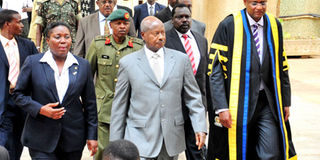President’s address called off as legislators demand respect

(L-R) Speaker of Uganda Parliament Rebecca Kadaga, President Museveni, and the Speaker of the East African Legislative Assembly, Mr Abdirahin Haithar Abdi after opening an EALA session in Kampala in 2010. Photo by ppu
What you need to know:
The President has on several occasions prevailed over Parliament on controversial matters.
As the President’s scheduled address to Parliament today was being called off yesterday, MPs and senior lawyers asked him to respect the doctrine of separation of powers for the good of democracy in the country.
The appeal to the President stresses the importance of the doctrine as envisaged in chapters six, seven and eight of the Constitution which outline the roles and functions of the Executive, Legislature and Judiciary. It comes at a time when the President has on several occasions prevailed over Parliament on controversial matters.
Lweimyaga MP Theodore Ssekikubo confirmed that members received an email message saying: “There is no special sitting tomorrow, the President is not available.” Mr Ssekikubo said he was puzzled by the message since ruling party MPs have been invited to a morning caucus meeting tomorrow which will be attended by Mr Museveni where the way forward on the oil Bill is going to be discussed.
Senior Counsel Prof. Frederick Sempebwa, who chaired the 2001 Constitutional Review Commission, told Daily Monitor that although it is not wrong for the President to persuade his party members to accept his position, it is against the spirit of separation of powers for him to force them to rescind decisions they have taken. “For good democracy, separation of powers is important. None of the three organs [of State] should lack respect for the other otherwise it will be a dictatorship,” Prof. Sempebwa said.
“It is okay for the President to try to influence his members as long as it is not about changing the already made decisions. But if he fails to get their support, he does not force them to do what they do not want.”
Prof. Ssempebwa, however, observed that both the President and the MPs share some blame. “You can fault the President but you can also fault the NRM MPs. If his supporters think what they have done is good, they should never change their stand,” he said.
There is a stalemate between the Executive and Parliament over clause nine of the Petroleum (Exploration, Production and Development) Bill, 2012, with Mr Museveni trying to force Parliament to review its earlier decision and give the minister for energy unlimited powers in the oil sector.
Yesterday, State Minister for Karamoja Affairs Nekesa Oundo defended her boss. “If the President was a dictator, you would be seeing Cabinet passing Bills by itself without involving Parliament,” she said. “The President is the Commander-in-Chief, if Ugandans have entrusted him with their lives all this long, what about a resource?”
Explaining the importance of separation of powers, Mr Higiro Semajege, a former member of the Constitutional Review Commission, said the President was entrusted with substantial powers on the assumption that the bearer of that office would be well-intentioned. “But now MPs have discovered confusion and interference and have developed a fear against the President in especially how he handles issues of corruption. It is now possible to mislead the President,” he said. “Ever since we made the law, it is now possible for a President to misuse the powers and if I were to be an MP now, I would also oppose that proposal to give the minister of energy unlimited powers.”
“I think the President respects the doctrine of separation of powers because he doesn’t just order them to do what he wants,” he said. “He doesn’t act directly against the Constitution. He calls the party members and convinces them on his beliefs…”
However, some MPs say what the President is doing in the oil debate is characteristic and disregards the doctrine of separation of powers. “It is about time that the Constitution is reviewed. Uganda is being overwhelmed by the phenomenon of Presidentialism. The President is interfering with Parliament privileges,” said Mr Odonga Otto (FDC, Aruu).
“Although it is the prerogative of the Executive to bring bills, 380 MPs are better than one person. He thinks that he has more support in Uganda than all the over 380 MPs combined but that is not healthy thinking for the President. They are now intimidating the Speaker.”
UPC’s Betty Amongi said support from the public is necessary to enforce separation of powers. “I am becoming worried that the Executive wants to merge the two arms using the powers of the President by using [the NRM] caucus and threats to the independent minded NRM MPs.”




